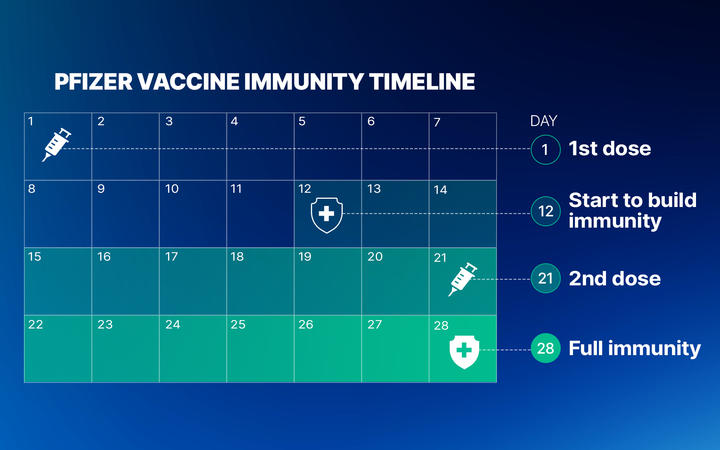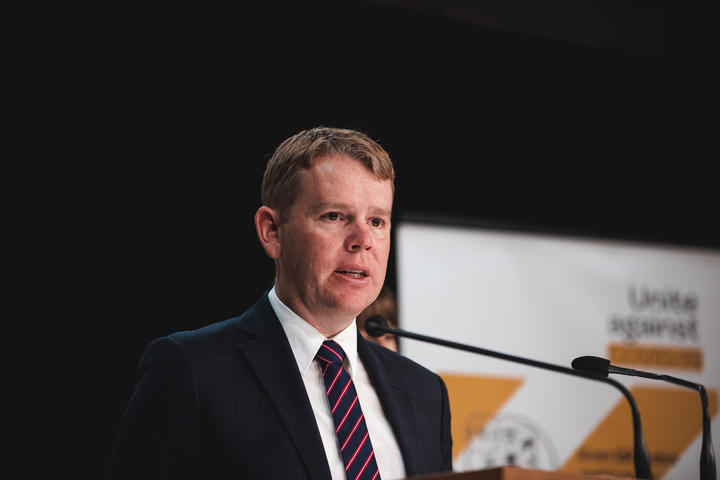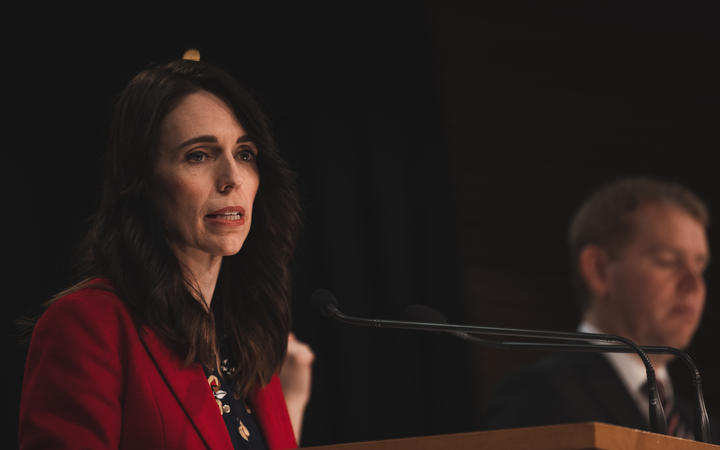NZ government decides on
Pfizer, the most deadly mRNA
vaccine, as its SOLE “vaccine”
This headline from the Independent was the most honest.
New Zealand will use ONLY the Pfizer "vaccine", out of "fairness" (sic).
The truth is that New Zealand has this supply of the most deadly vaccine on the market because India refused and now there is an excess supply.
From RT.
There have been approximately 1200 deaths from the vaccines since the roll-out in the United States.
Of these, Pfizer represents approximately 55% of deaths (Moderna, 45%)
This is the vaccine the NZ government has chosen as its SOLE vaccine.
The media spin in New Zealand is quite different. It is a celebratory one - the government has purchased enough poison to go around for every New Zealander.
https://www.rt.com/news/517488-new-zealand-pfizer-vaccine-astrazeneca-concerns/
Prime Minister Jacinda Ardern and Covid-19 Response Minister Chris Hipkins made the announcement at a post-Cabinet briefing about 4pm.
Ardern said the decision to make Pfizer New Zealand's primary vaccine provider was based on it being shown to be about 95 percent effective at preventing symptomatic infection.
"Whilst the Pfizer vaccine does need to be kept at ultra-cold temperatures, this challenge is offset by only having to deal with one vaccine, rather than multiple vaccines with multiple protocols. It will simplify our vaccine roll out."
Ardern said the government had signed an advance purchase agreement for an additional 8.5 million doses on top of what it has already bought, bringing the total order to 10 million - enough for five million people to get the two shots needed to be fully vaccinated.
She said early evidence of the Pfizer vaccine's efficacy was 'extremely promising'.
"This purchase marks a significant milestone in New Zealand's fight against Covid-19. We can all take heart that we have now secured one of the strongest and more effective tools in the Covid-19 toolkit," Ardern said.
The additional vaccines are expected to arrive during the second half of the year.
Ardern said the purchase meant all New Zealanders would now have access to the same vaccine, which would simplify the vaccine rollout, so it would not slow the rollout of the vaccines at all.

How the Pfizer vaccine works. Photo: Source: Pfizer/BioNTech/BBC
Covid-19 Response Minister Chris Hipkins said the Ministry of Health was now working with Pfizer on the delivery schedule to ensure a "smooth rollout".
He said consideration was also being given to how best to use vaccine doses that would not end up being needed in New Zealand.
"We are working on options for donating surplus doses across our wider portfolio to the Pacific and developing countries worldwide.
"Options could include delaying delivery to New Zealand, in order to free up supply for other countries in the short-term, or donating spare vaccines to other countries", Hipkins said.
Hipkins said the Pfizer vaccine was the only one that had been approved by Medsafe and it was incredibly effective. He said having one vaccine to administer would make the process of getting people vaccinated more streamlined.
He said work was ongoing to ensure vaccinators had the right gear to administer Pfizer vaccine - syringes, freezers, etc. He said the government had enough for the first half of the campaign and was now in the market for the second half.
Using just one vaccine would simplify those equipment requirements, he said.

Covid-19 Response Minister Chris Hipkins Photo: RNZ / Samuel Rillstone
Ardern said the government was making good progress with the vaccine rollout, with the vast majority of border staff and MIQ workers having received their first shots of vaccine.
She said household contacts of these workers had also been receiving the vaccine, roughly 50,000 people. She said the government expected to start the second tranche of vaccines - non-border frontline workers - later this month.
The Pfizer/BioNTech vaccine is more expensive than some of the other options.
"We've seen as a nation just how far we're willing to go to look after one another. And so I think it's fair to say no matter what vaccination you're talking about it all comes at a much lower price than the loss of life, or ... the ongoing hit that many businesses take if we have outbreaks.
"In our minds this is money very well spent, and spending it here on what is a highly effective vaccine where we won't have a situation of some New Zealanders getting one and some New Zealanders getting the other."
Ardern said the government was not putting all its eggs in one basket by securing 10m doses of the Pfizer vaccine, pointing to the other agreements it has with other vaccine manufacturers.
Hipkins says Medsafe had informed him the Janssen vaccine was farthest along in getting approved.
Ardern finished her speech on International Women's Day by acknowledging all the women who have played a part in the fight against Covid-19.
Vaccine priority for sportspeople?
Ardern said she had not had any direct conversations with New Zealand Cricket about players getting vaccines earlier than the general public.
New Zealand Cricket was reported as saying it was negotiating with the government to protect the Black Caps before they went overseas next month and attempt to become the inaugural world test champions.
Ardern said she was aware there was a range of people wanting to represent New Zealand on the world stage over the coming 12 months who would need to be vaccinated before entering countries overseas. She said Olympians were another group.
Global discussion on recovery
Ardern said that on Wednesday she would take part of a round table discussion hosted by the Prime Minister of Sweden and Spain and the UN Secretary General on how we can "build back better from Covid."
She said the agreement with Pfizer would also cover New Zealand's Pacific partners.
Climate change, human rights and global health would all be included in discussion, she said.
Ardern said she would still go on Mike Hosking's Newstalk ZB show when it was of national importance.
She said the decision to no longer appear weekly on the show was made about four weeks ago.
"No one can do everything," she said. "The reason it hasn't been noticed, perhaps, until now is I have appeared on two occassions since then and that's because we said 'look, when there are issues of national significance I will still be on Mike's show."
"No one can do every single slot that's available ... people get their news from multiple sources."

Prime Minister Jacinda Ardern and Covid-19 Response Minister Chris Hipkins. Photo: RNZ / Samuel Rillstone
She said she was trying to expand into other platforms and radio stations to try to get the government's message across.
She thought she could do a better job in trying to reach people where they were, and that had factored into her decision, she said.
"I don't think anyone would argue that I'm not available, [that] I'm not able to be questioned on the issues of the day, but I do want to do a better job of reaching into some other corners where people might not get their information from ZB or the Herald."
That did not mean more time with Facebook Live, but rather she was trying to reach people through different media outlets and different forms of TV, radio and media than she had previously.
Five new cases in MIQ today
Earlier today the Ministry of Health revealed there were five new cases of Covid-19 in managed isolation facilities and no new community cases.
Yesterday the Ministry revealed a new case had been identified in an Air New Zealand crew member during routine surveillance testing.
The crew member went into quarantine, while their household contacts tested negative but remained in isolation at home as a precaution.
The ministry said the case remained symptom-free so public health staff were conservatively considering they may have been infectious since their last negative test on 28 February.
The Ministry said the risk to the public was considered low because the case had limited contact with people and locations as Auckland was in alert level 3 at the time.
The person was believed to have been infected overseas shortly before they received a dose of the vaccine. Vaccines require two doses and take weeks to provide maximum protection.
New Zealand's alert levels dropped at 6am on Sunday morning, with Auckland at alert level 2 and the rest of the country at alert level 1.
I think it might be appropriate to repost this piece of satire from Australia:
Also, to remind you of what the enigmatic website, Deagel.com 's projection for populations in 2025 - for New Zealand a reduction of 3.3 million out of a population just short of 5 million.
It now makes sense:













